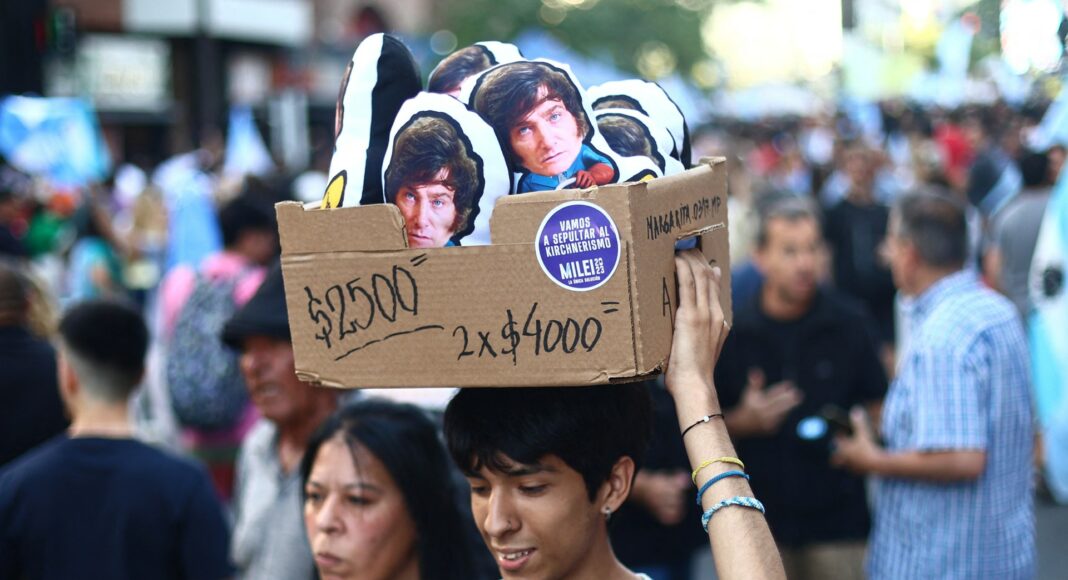EXPLAINER
Massa represents the ruling establishment while Milei wants to turn the tables with radical policies.
Argentina is heading for a run-off election on Sunday, which will pit a centrist and a far-right candidate against each other in a vote that promises to have wide-ranging consequences for the South American nation.
Sergio Massa, the country’s economy minister and candidate of the ruling Union for the Homeland coalition, will face off against Javier Milei, who has grabbed headlines with his eccentric personality and radical – even controversial – promises.
Here’s what you need to know about who could become Argentina’s next president and why that matters.
Who are Massa and Milei?
The 51-year-old Massa represents the governing Peronist coalition. Based on the ideas and legacy of former president and military commander Juan Peron, the Peronist movement has been the country’s main political force for the past eight decades.
Massa is seen as a pragmatic figure within the leftist movement, which has helped him convince more moderate votes as well.
He is challenged by the 53-year-old Milei, an economist who sits at the helm of the Freedom Advances party. The far-right libertarian describes himself as an “anarcho-capitalist” and was the surprise frontrunner of the primary election in August.
Through his rhetoric and extreme promises, Milei has expressed his interest to “chainsaw” through a system that has left Argentina reeling from its worst economic crisis in decades.
Milei has drawn comparisons to right-wing leaders like former United States President Donald Trump and ex-Brazilian President Jair Bolsonaro. But unlike both Trump and Bolsonaro, Milei has managed to win support from youth voters.
Why a run-off?
Massa, Milei and several other candidates were on the ballot in an election in late October.
No one managed to secure the 45 percent of the vote — or 40 percent plus a 10-point lead over their closest competitor — that was required for an outright victory during the first round of voting.
Pollsters had given Milei a better chance of winning, but polls proved to be largely unreliable as they had been in some past elections. Massa came out on top with 37 percent of the votes to trump Milei’s 30 percent.
But that still wasn’t enough, so Sunday’s vote will determine the president.
What have they promised?
The economy has been at the centre of campaign promises as Argentina’s inflation is running triple digits at more than 142 percent, and the poverty rate stands at 40 percent.
Massa has rolled out welfare handouts and tax exemptions, but he will likely have to pull them back after the election in case of a victory as he contends with a sizeable budget deficit that stood at 2.4 percent of Argentina’s gross domestic product last year.
He also aims to carry on with his gradual fiscal reform policies as the country owes roughly $43bn to the International Monetary Fund (IMF) and $65bn to external bondholders from previously restructured debts.
Milei has taken a completely different approach, putting forward policies that almost entirely contradict those of his opponent.
He has promised to drop the national currency, the Argentine peso, and instead adopt the US dollar; “eliminate” the central bank; slash government spending by a whopping 15 percent of GDP; scale back public health expenditure; and privatise some state companies.
He has also ignored warnings by his opponent that touching subsidies for utilities could significantly increase prices, promising to remove subsidies on gas and electricity.
Milei has railed against abortion rights, questioned the role of humans in climate change and promised cultural reforms as he has presented himself as an opponent of socialism at home and abroad. His positions have also sparked concerns among Argentina’s Indigenous peoples.
What happens next?
Argentinians will head to the ballots, which will open at 8am local time (11:00 GMT) and close at 6pm, on Sunday.
The person who manages to garner the most votes will be elected to govern for a four-year term, and will take office on December 10.
Milei could still pick up momentum after he secured backing from conservative Patricia Bullrich, who finished third with 6.3 million votes or about 24 percent during the first round of voting.
Massa, meanwhile, may be able to count on Juan Schiaretti, a Peronist who is outside the main coalition, to support him. Schiaretti, however, has been critical of the economy minister in the past.
Voting is mandatory for people between 18 and 70 in the country of roughly 45 million, and optional for those between 16 and 17 and those over 70.



